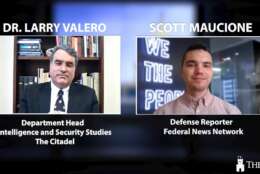Analysis
-
This week, hosts Mark Masselli and Margaret Flinter speak with Dr. Rick Bright, Sr. Vice President for Pandemic Preparedness and Response at The Rockefeller Foundation, former chief of the Biomedical Advanced Research and Development Authority (BARDA) at HHS, and member of the Biden Transition Team on COVID-19. Dr. Bright is launching a new pandemic preparedness initiative at The Rockefeller Foundation, creating the first-of-its-kind national and global pandemic surveillance infrastructure to alert governments around the world about emerging pandemic threats. Dr. Bright resigned his post at BARDA after filing a whistleblower complaint against the previous administration for mishandling of the pandemic response.
March 18, 2021 -
As part of our DOD Cloud Exchange event in March, Federal News Network sat down with Hitachi Vantara Federal's Chief Technology Officer Gary Hix for a virtual chat on all things hybrid cloud. The following Q&A features segments from our discussion.
March 17, 2021 -
Studies show that despite advancements in closing insurance and pay gaps, women are still less likely to own life insurance policies, and more likely to own lower coverage amounts than their male counterparts.
March 16, 2021 -
According to 2019 consumer study conducted by LIMRA, only 56% of women have life insurance, compared to 62% of men. Moreover, women are likely to carry less coverage than their male counterparts.
March 16, 2021 -
Climate change may not be an existential threat to the United States in the same way as nuclear or biological weapons. But it does negatively affect military operations both in the U.S. and around the world.
March 16, 2021 -
The intelligence community has had a bit of a rocky road the past few years when it comes to working with the former president. However, despite the politics, careers in the field are still grabbing the attention of young people and inspiring employees with exciting missions.
March 15, 2021 -
Hosted by Dr. Richard Shurtz and Jim Russ. Sponsored by Stratford University. No more crying over spilled soda. And we remember the inventor of the cassette tape.
March 15, 2021 -
On FEDtalk this week, join Tony Vergnetti and Brenda Wilson of FEDS Protection for a discussion on how and why federal employee decisions in preparing for, handling and responding to situations are so highly scrutinized. …
March 11, 2021 -
Dave Bottom, the SEC’s chief information officer, said a new IT cost manager will review and analyze the agency’s spending on cloud services on a day-by-day basis.
March 09, 2021 -
Getting a handle on system assets is key to undertaking legacy upgrades, scaling data input and enabling systems to take actions to enforce policies.
March 08, 2021 -
Hosted by Dr. Richard Shurtz and Jim Russ. Sponsored by Stratford University. How to hide your notifications from your phone’s lock screen. And we meet the American pioneer who coined the term "machine learning.”
March 08, 2021 -
What are some of the key trends in government technology? How are government agencies such as the IRS using emerging technologies to meet their missions? How can industry and government collaborate more effectively? Join host Michael Keegan as he explores these questions and more with Harrison Smith Director, Enterprise Digitalization at Internal Revenue Service and President of the ACT Executive Committee?
March 08, 2021 -
Monitoring potential criminals or terrorists, and developing counter threats, whether physical or cyber, is increasingly becoming a matter of data analytics. Nowadays every domain of criminal activity – for example, crimes against children, financial, trafficking in illegal drugs or firearms, or deliberate disinformation campaigns – have a cyber nexus.
March 05, 2021 -
Thanks to advances in information technology, data about everything has become an abundant commodity. But it’s not always a highly available one. That’s got to change, because recent statute and policy obligates federal agencies to use data in decision making about programs, operations and budgets.
March 02, 2021 -
Hosted by Dr. Richard Shurtz and Jim Russ. Sponsored by Stratford University. How to recover saved passwords from Safari on your iPhone.
March 01, 2021














